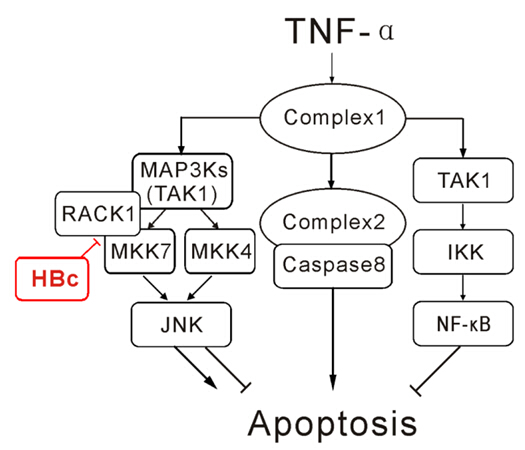On November 26, the international academic journal, Journal of Virology, published an article online entitled “Hepatitis B core protein sensitizes hepatocytes to tumor necrosis factor-induced apoptosis by suppression of the phosphorylation of mitogen-activated protein kinase kinase 7”. This research was accomplished by Ph.D. student Baosen Jia with supervision of Drs. Ke Lan and Qiang Deng at Institut Pasteur of Shanghai, Chinese Academy of Sciences.
Hepatitis B, which caused by Hepatitis B virus (HBV) infection, remains a major health threat worldwide. Hepatic injury and regeneration from chronic inflammation is the main driving factor of liver fibrosis and cirrhosis in chronic hepatitis B. Pro-inflammatory tumor necrosis factor (TNF)-α has been implicated as a major inducer of liver cell death during viral hepatitis. HBV itself is not considered to be directly cytopathic for infected hepatocytes. This notion has to be re-examined, however, in a pathophysiological setting.
Jia and colleagues discovered that in hepatoma cell lines and in primary mouse and human hepatocytes, expression of hepatitis B core (HBc) protein made cells susceptible to TNF-α-induced apoptosis. They identified receptor of activated protein kinase C (RACK) 1 as an HBc interacting host protein by tandem affinity purification and mass spectrometry. RACK1 was recently reported as a scaffold protein that facilitates the phosphorylation of mitogen-activated protein kinase kinase 7 (MKK7) by its upstream activators. The study by Jia and colleagues showed that HBc abrogated the interaction between MKK7 and RACK1 by competitively binding to RACK1, thereby down-regulating TNF-α-induced phosphorylation of MKK7 and the activation of c-Jun N-terminal kinase. In line with this finding, specific knockdown of MKK7 increased the sensitivity of hepatocytes to TNF-α-induced apoptosis, while overexpression of RACK1 counteracted the pro-apoptotic activity of HBc. Capsid particle formation was not obligatory for HBc pro-apoptotic activity. The present study is thus a first indication of the pathogenic effects of HBc in liver injury during hepatitis B.
This study was supported by grants from the National Science and Technology Major Projects, Natural Science Foundation, and National Key Basic Research Program of China.


